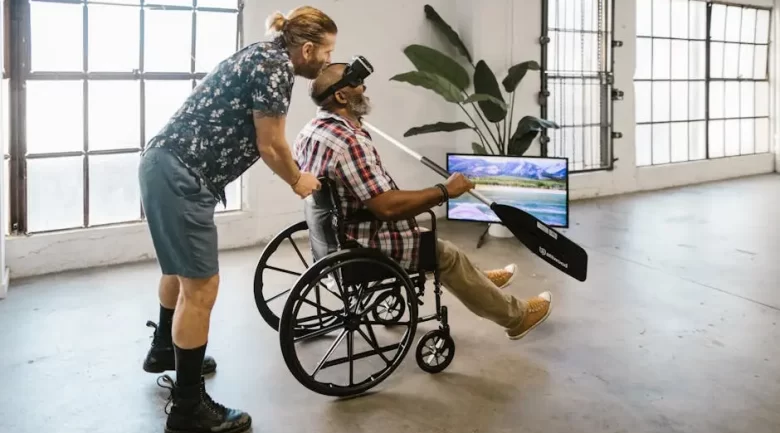As the world adapts to new technologies, virtual engagement has emerged as a powerful tool in dementia care. This innovative approach not only improves communication but also fosters a sense of community and connection for individuals living with dementia and their caregivers. In this blog post, we will explore how virtual engagement can transform dementia care through various meaningful methods and activities.
1. Improving Communication Through Digital Platforms
In today’s world, communication is crucial, especially for individuals living with dementia. Digital platforms offer innovative ways to bridge the gap between caregivers and dementia patients. Through video calls, messaging apps, and social media, caregivers can stay connected, provide updates, and even share daily experiences without compromising the comfort of home. These connections are essential as they enable patients to maintain relationships, helping reduce feelings of isolation.
Moreover, these digital platforms can be tailored to suit the unique needs of each individual. For instance, tools like story-sharing applications allow caregivers to foster important conversations. By encouraging individuals to share their personal stories or engage with loved ones through interactive media, a new dimension of communication is created that emphasizes connection and understanding, enhancing the overall care experience.
With technology continuously evolving, it’s no surprise that these advancements improve communication strategies. By embracing virtual engagement, caregivers are equipped with better ways to reach and emotionally connect with those under their charge, making it a vital asset in dementia care.
2. Enhancing Social Interaction with Virtual Meetups
Social interaction is key to maintaining mental health, and virtual meetups provide an excellent solution for individuals experiencing dementia. These gatherings can include game nights, book clubs, or even casual chats, all held in a comfortable virtual space. This creative approach allows individuals to engage socially without the stress of travel or leaving their familiar surroundings.
Over time, these virtual connections can significantly boost mood and cognitive function. Studies show that socializing helps stimulate the brain, and virtual meetups can be accessible even for those with mobility challenges. Drop-in sessions give them the opportunity to meet new people or reconnect with old friends, which is invaluable as they navigate their condition.
Additionally, family members can easily participate in these virtual gatherings. This inclusivity strengthens bonds and allows for shared experiences and collective joy, contributing positively to the patient’s sense of self and happiness. The beauty of virtual meetups lies not just in the social interaction but also in the opportunity for continuity of relationships, which is crucial in upholding the dignity and spirit of those dealing with dementia.
3. Utilizing Online Games for Cognitive Stimulation
Online games have turned out to be an unexpected ally in dementia care, offering a fun yet effective way to enhance cognitive stimulation. These games range from memory challenges to puzzles, tailored edutainment that engages players while promoting critical thinking and problem-solving skills. By inviting patients to participate in these activities, caregivers not only distract them from the symptoms but also stimulate their minds.
Moreover, the format of online games allows for flexibility. They can be played at any time, accommodating the patient’s schedule and energy levels. As individuals choose games that truly resonate with them, they find themselves more motivated to participate. This autonomy fosters a sense of achievement that can greatly enhance their overall mood and cognitive function.
For caregivers, utilizing online games creates opportunities for interaction as well. Playing together can deepen relationships, making it a bonding activity rather than just a solitary one. The joy of engaging in light-hearted competition or collaborating towards a common goal can be immensely beneficial, demonstrating that virtual engagement can bring about not only stimulation but also fun and laughter.
4. Facilitating Remote Family Connections
One of the most profound benefits of virtual engagement is its ability to foster remote family connections. In a time when family members may be spread far and wide, digital tools provide a crucial lifeline for maintaining close ties. Video calls, for instance, allow family members to share experiences and keep the spirit of togetherness alive despite physical distance.
For individuals with dementia, seeing familiar faces and hearing the voices of loved ones can evoke powerful memories and emotions. These moments of connection can significantly improve their emotional well-being. Scheduling regular video calls or virtual family gatherings serves as a consistent opportunity for meaningful interactions, helping to alleviate feelings of loneliness or confusion that can accompany dementia.
Additionally, technology enables families to share important milestones in real-time, which can bring immense joy to both patients and their families. Whether it’s watching a grandchild’s graduation or celebrating a birthday, inclusivity in these events is essential to reinforcing familial bonds. Thrusting a digital spotlight on family unity, virtual engagement thus plays a crucial role in enhancing the quality of life for individuals with dementia.
5. Encouraging Creativity Through Virtual Art Sessions
Creativity can flourish in the most unexpected places, and virtual art sessions are a perfect example. These sessions allow individuals with dementia to express themselves artistically, providing a therapeutic outlet for emotions and thoughts that may be difficult to articulate verbally. Whether through painting, drawing, or even digital arts, the creative process can be immensely meditative.
Moreover, virtual art classes can be tailored to fit different levels of ability, ensuring that everyone can participate in a way that feels comfortable and inspiring. Providing participants with guidance and support can lead to wonderful creative expressions, and knowing they are part of a collective experience fosters a sense of belonging and community.
As creativity flows during these sessions, individuals also gain confidence and self-esteem, which often deteriorates due to the challenges of dementia. Celebrating their artistic achievements, whether through a virtual gallery or by sharing creations with family, helps in transforming perceptions of their capabilities, allowing them to feel valued and appreciated.
6. Providing Access to Educational Resources
In an age defined by information, virtual engagement also affords caregivers and patients incredible access to educational resources. Online platforms not only offer articles, tools, and webinars but also connect individuals with experts who specialize in dementia care. Educating both caregivers and patients about their condition is crucial for empowering them and fostering better overall outcomes.
Access to educational resources can lead to a greater understanding of dementia, helping families feel more equipped to handle the challenges they may face. For instance, virtual workshops designed specifically for caregivers can provide them with actionable strategies and insights into patient care, positively impacting the day-to-day lived experiences for everyone involved.
Furthermore, engaging with educational content can also spark meaningful discussions between caregivers and patients. Whether it’s discussing coping strategies, memory techniques, or areas of interest, sharing knowledge can enhance the quality of interactions and provide a backdrop for deeper connection. Virtual engagement thus becomes not just an information portal but an avenue for shared growth and understanding.
7. Offering Support Groups via Online Forums
Support is instrumental in managing dementia, and virtual engagement through online forums can provide much-needed solace and understanding. These groups enable caregivers and families to connect with others facing similar challenges, creating a supportive community. Sharing experiences and advice fosters a sense of belonging—knowing they are not alone in this journey.
Various platforms now offer dedicated spaces for caregivers to seek guidance, vent frustrations, or celebrate wins. By having this resource at their fingertips, individuals can access support whenever they need it. The anonymity of online forums can also provide comfort for those who may feel hesitant to share their story in person, removing that additional layer of stress.
Additionally, these online groups often feature expert-led discussions, providing members with education and new strategies for care. The blending of community support with professional insight is a powerful combination that can energize caregivers, encouraging them to continue their essential work with renewed vigor.
8. Exploring Virtual Reality Experiences
Imagine stepping into a world where memories can be revisited at the touch of a button—this is the magic of virtual reality (VR) experiences. For individuals with dementia, VR opens doors to remembrances and experiences that may be fading away. Activities such as virtual tours of landmarks, nature adventures, or historical recreations can invoke nostalgia and stimulate conversations, significantly enhancing cognitive engagement.
These VR experiences are tailored to evoke emotional and sensory responses that can trigger memories and feelings of joy. The immersive nature of VR makes it an effective tool not only for cognitive stimulation but also for emotional connection, allowing caregivers to engage patients in unique ways. Transcending the limitations imposed by dementia, VR has the potential to create moments of discovery and delight.
Furthermore, shared VR experiences can facilitate bonding between caregivers and patients, making it an enriching activity. Exploring new places together can reignite curiosity and create dialogue, bridging generational gaps and allowing them to build cherished connections, emphasizing the profound impact that virtual engagement can have.
9. Implementing Telehealth for Routine Check-ups
Telehealth is rapidly changing how healthcare is delivered, and for individuals with dementia, it offers convenience without sacrificing quality. Regular check-ups are vital, but often cumbersome for patients with mobility challenges. Telehealth allows healthcare professionals to conduct these appointments seamlessly, providing medication management and monitoring cognitive health, all from the comfort of home.
Through telehealth, caregivers can also get immediate advice from medical professionals, which is invaluable in times of uncertainty. Having a reliable channel to discuss concerns about their loved ones can alleviate stress and ensure that patients receive timely interventions. Consistency in care speaks volumes in dementia management, and telehealth meets this need effectively.
Additionally, embracing telehealth opens doors for more holistic care approaches, integrating mental and physical health services. As individuals with dementia are seen by medical professionals regularly, their caregivers feel supported in their efforts to provide the best possible care, ultimately enhancing the quality of life for both parties.
10. Creating Personalized Care Plans Online
Personalized care plans are critical in navigating the unique challenges faced by individuals with dementia, and online tools now simplify this process. Caregivers can create tailored plans that account for the patient’s preferences, abilities, and changing needs. This digital approach not only optimizes care but also instills a sense of dignity and respect for the individual’s autonomy.
By documenting progress and challenges, caregivers can adjust these plans dynamically, ensuring that they remain effective as the patient’s condition evolves. Online platforms that facilitate collaboration among caregivers, family members, and healthcare professionals create a cohesive support system dedicated to enhancing the patient’s quality of life.
Furthermore, having a centralized place for care plans encourages greater communication within families. By involving family members in discussions about care choices and strategies, everyone feels included and informed, ultimately leading to a more supportive network. This personalized approach underscores the importance of understanding the individual at the heart of care, enhancing their overall engagement and happiness.




